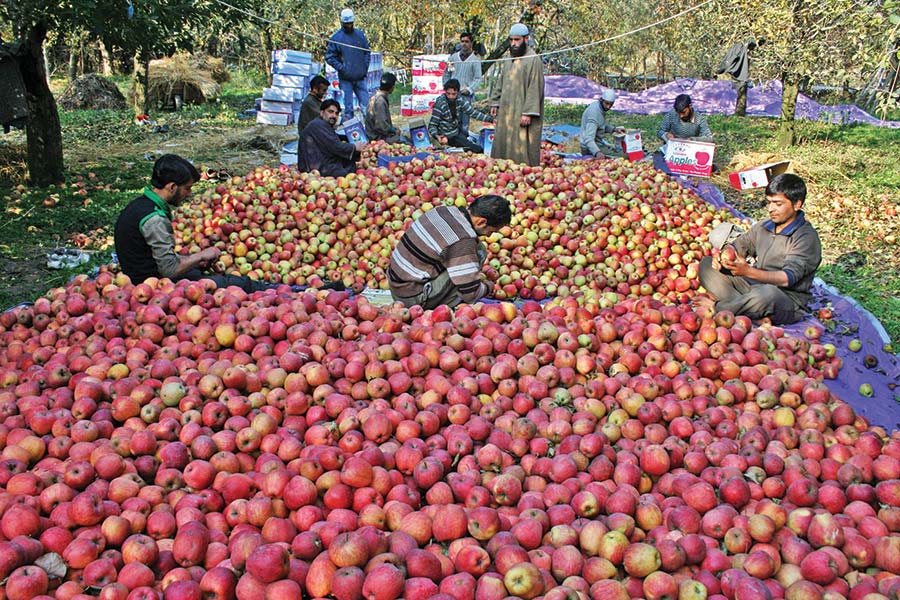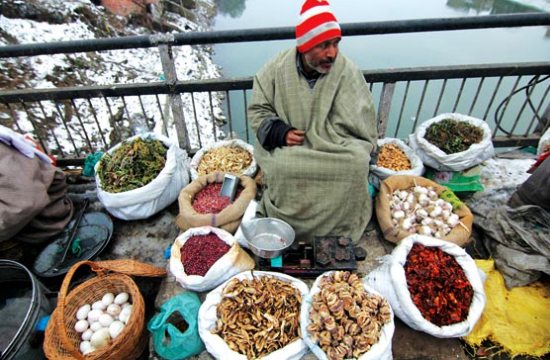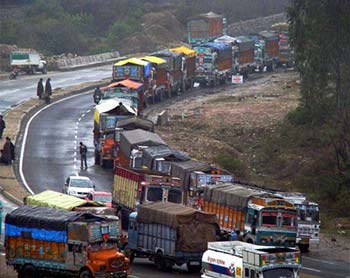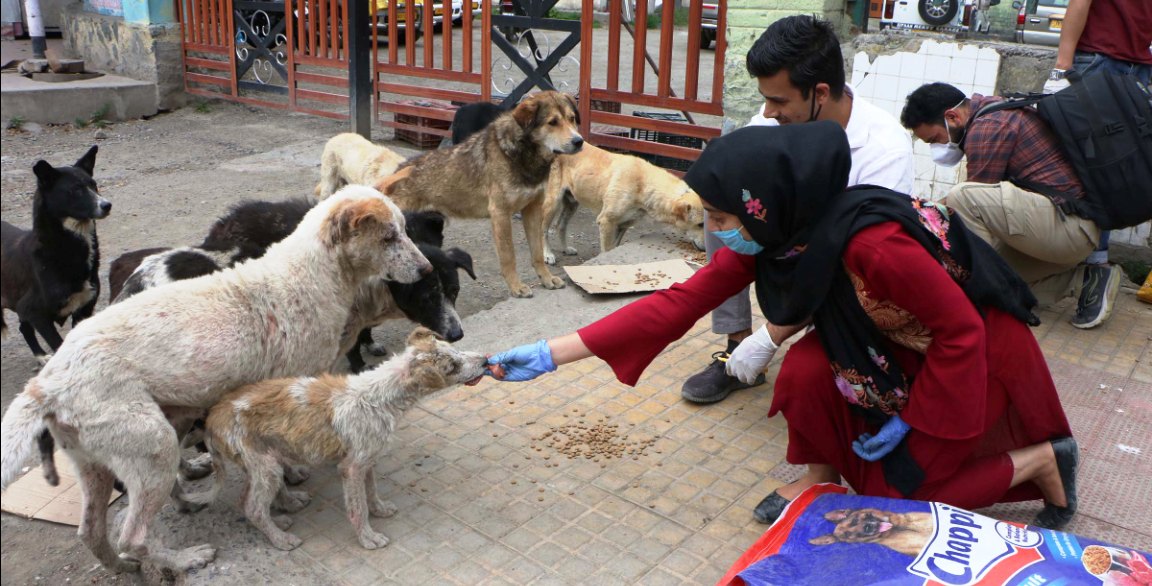by Masood Hussain
SRINAGAR: With the Srinagar Jammu highway closed for eight days, Kashmir is paying through its nose. It may not have anything to do for what the weather situation did to the run-down and sick highway but it pays a fortune for the connective collapse.
A Truck Highway
The new highway is looking more of a long serpentine line of trucks and not a road. In fact, one lane is completely blocked by the trucks that are ideally parked for last many days.
“We have almost 4500 trucks lined up between Levdora and Qazigund,” one senior police officer said. “I believe nearly 700 are loaded and mostly carrying apple. I believe the number of outgoing trucks stranded in Kashmir is upward of 6000 as some drivers have parked their trucks in far away safer places and not on the highway.”

The presence of such a large number of trucks in the area has led a voluntary effort by the civil society that has been distributing the basic food items to the truckers on the highway. While truckers are facing massive loss for not being able to work because of the road closure, some of them lack the capacity to even purchasing the food. In certain cases, most of the trucks are located far away from smaller village markets and are not in a position to move out and make purchases.
“It is winter and we already have a vegetable deficit,” Bashir A Bashir, the president of the traders at the Fruit Mundi association said. “By an average, we would receive almost 35 truckloads of vegetable daily, which has not come for all these days. Now, we have almost 300 truckloads laden with apple that is rotting on the road.”
Shabir Ahmad Mir, a south Kashmir resident, who trekked part of the highway to rush home where his father had died, during the initial days of the road closure said he watched truckers emptying their vegetable load and feeding herds. “They did it to prevent damage to their truckers as the load was rotting,” he said. From Ramban, he took two days on foot to reach Anantnag but missed father’s funeral prayer.
Bashir said the apple-laden trucks are mainly the fruit that growers had kept in their own sheds and stores. This, he said is the conventional tradition that people, taking advantage of the low temperature, were retaining part of the produce for delayed dispatch during early winter. “This fruit is completely lost, it would not fetch much now because it was in open for all these days and is damaged.”
The loss is on the other side too. “My report is that almost 100 trucks loaded with vegetables were Kashmir bound at different spots when the road got closed,” Bashir said. “Most of this is also destroyed and is unfit for any consumption.” Some truckers who had the option of going back have actually left. Now people have gone back to using the traditional sun-dried vegetables.
The Major Loss
But the major loss to the apple was to the lot that was loaded from the controlled atmosphere stores (CAS) and the traditional cold stores. Kashmir retains almost 1.12 lakh metric tonnes, mostly in the CAS. This capacity is getting to 1.5 lakh metric tonnes by the end of 2019, industry sources said.
“In routine cold stores, the life of the apple is perfectly four months and if you keep it beyond that, it has problems. Routine cold stores are slightly different from the CAS,” one industry insider said. “Thank God, we do not have more than 2000 tons of routine cold storage.”

In these routine cold stores, the stored produce is sold in January and early February but the road blockade has done away with that system. Now it is getting into the latter part of February which will obviously reduce the returns of this small quantum of fruit currently in the routine cold stores.
“Some growers had started moving the fruit from the CAS stores but in most of the cases, they put it back because of the road conditions,” Sana Masood, who heads the Harsha Naturals, Kashmir’s CAS major. “But right now there are almost sixty plus truckloads carrying the apple that was taken out from the CAS storage from Lassipora and around. Part of it might have suffered while being on the road.”
An 8-ton truckload of apple is about Rs 10 lakh. “In certain cases, it might even be more,” she said. “Whatever stored, which is almost one lakh ton, is safe and secure.”
Bigger Worries
The total apple produce stores in CAS is not a small quantum, it is upwards of 11000 truckloads that value more than Rs 1000 crore.
“The road blockage has affected our marketing plans and this can have a serious impact on the entire sector,” Majid Wafaie, who heads the CAS chain association said. “It is a tragedy that our market plans are decided what happens on the Shaitan Nulla in the twenty-first century.” A spot on the highway, the Nulla is notorious for the killer shooting stones.

CAS sector insiders said the returns of the growers and those of store owners are strictly linked to how they will market the apple produce that is stored at a good cost. “We go for gradual marketing of it strictly based on the market conditions and we take into account the demand aspect that usually shoots up in this part of winter when the apple is not available in the market,” Majid said. “Now we have a lost the golden week.”
There are three critical issues confronting the sector. Firstly, the American apple will start arriving by the end of February and that will give a good competition thus impacting the returns. Secondly, not many fruits were available in the market and now we will have to get into competition with other fruit that will get into the market like Guava and other things. Finally, when the road opens, the growers will rush their crop to the markets outside and the glut will reduce the demand thus reducing the prices.
“The only positive thing the crisis had is that the cold stores in parts of Himachal and south India are sold out so the quantum of apple is less, mostly from Kashmir. We, however, will have to compete with the American imports that usually takes place in March.”
Slender Stocks
“Stocks are adequate except for petrol,” Mohammad Qasim Wani, Director Consumer Affairs department said. “We are told that more than 100 tankers carrying LPG and fuels have crossed into Kashmir after days of being stranded on the highway. This will help us improve the stock position of all the essentials.”

Together with FCI and all the oil companies, the government retains a supply position for not less than 40 days. This excludes the stocks of the defence forces.
The shot up demand of vegetables against no supplies has actually altered the prices fairly. “We get the green vegetables for Rs 80 plus and even capsicum for Rs 85, a kilogram,” Fayaz Ahmad, a consumer said. “It is too much for these basics.” He said that he purchased a tray of eggs for Rs 180, Rs 50 more than the normal rate.
Qasim said they were in the market the whole day and did not see any major profiteering because not many stocks are around.
An official posted in the tunnel region said the positive development is that one of the two Jawahar Tunnel tubes has been made operational. Though a new tunnel of the alternative highway is ready, it is waiting for some more interventions before it is going to be opened for traffic, this summer.
“We had one tube blocked up to 41 meters inside by the avalanche and another tube up to 25 meters,” the official said. “This was because of the pressure of the avalanche that hit the tunnel and killed eight people.”
The road, he said, is through between Banihal and Kashmir through the one tube that is operational. “Another tube will take a day or more and the people are working on it,” the official said.
The road was basically hit by a series of landslides mainly at Panthal. “It is a major slider that has impacted the main road and will take some more time, maybe till late tonight,” the official said. “But unfortunately, there was another landslide Tuesday morning on the banks of Nach Nulla near Ramban. People are working on it and will take their time.” Some new slides were reported in the afternoon.

“Srinagar NHW blocked due to landslide at Marog, intermittent shooting stones between Ramban- Banihal stretches,” Traffic Police informed on its Facebook page Monday night. “The decision regarding the vehicular movement on Jammu-Srinagar NHW shall be taken tomorrow on 12.02.2019, after assessing the weather/road condition.”
Mughal Road, the other connectivity between Kashmir and the rest of the world is also closed. There is also no movement possible towards Sonamrag as snow accumulation is too much. Srinagar witnessed protests by the people from Karnah who are stranded here as the Sadhna Pass was closed.
A senior Jammu and Kashmir Traffic Police officer said almost 600 vehicles, half of them trucks, were allowed to move towards Kashmir. “These include almost 300 light motor vehicles (LMV) and some of them have actually crossed the tunnel,” the officer said. “Weather is not positive so I keep my fingers crossed.” A trucker aide who was caught in the mess around Udhampur confirmed they have been permitted to move. “It is moving slowly but it is actually moving after lot many days,” he said.
Most of the commuters who were stranded around Banihal have already availed the rail service to get into Kashmir. In this stretch, only those people were caught who were self-driving.















